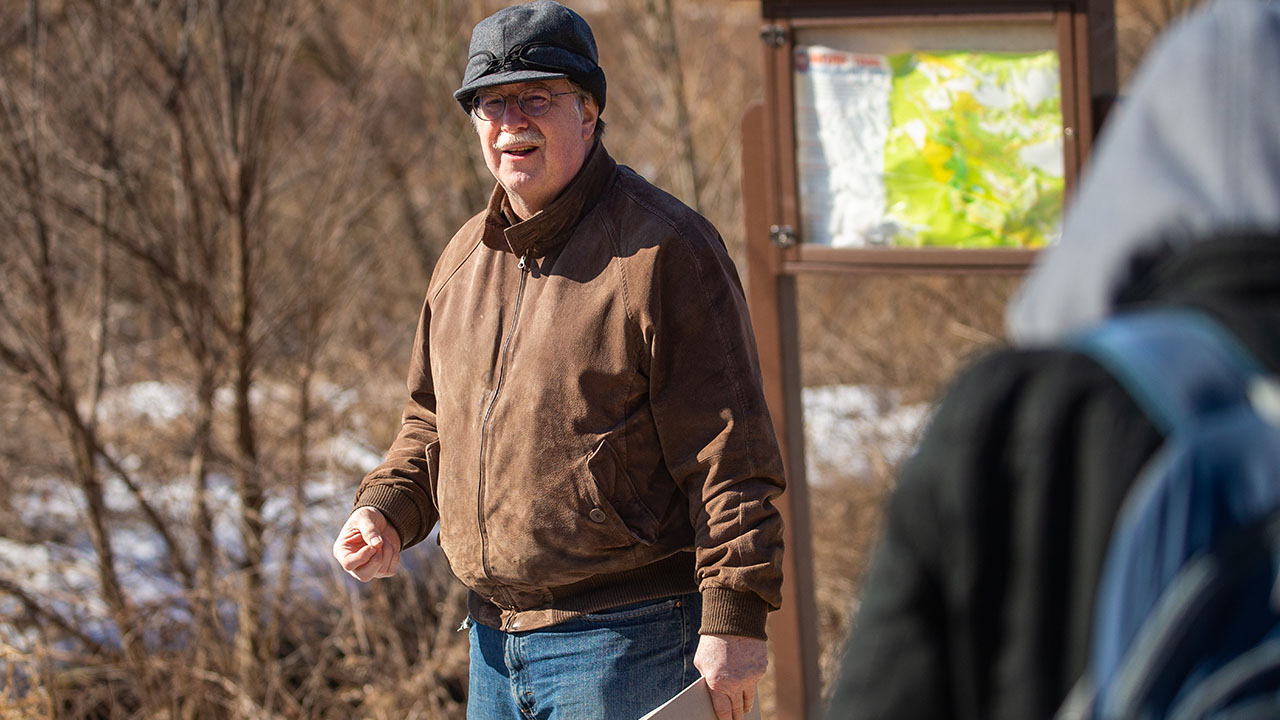
“I love interacting with the students, especially seeing them ‘get’ how things happening elsewhere affect them.” – James (Jim) Valiga, instructor of geography at UW-Platteville.
When James (Jim) Valiga began teaching geography classes at the University of Wisconsin-Platteville in fall 2013, his main goal was to pass on his life experience and knowledge. Each day, he strives to provide students with the knowledge, skills and support they need to succeed in their careers and be curious about the world.
Valiga’s career path provided him with a multitude of valuable experiences that eventually led him to teaching. After earning a Bachelor of Science in geography and geology from UW-Stevens Point, he worked as a hydrologist for the United States Geological Survey in Madison, where he had the opportunity to work on the first computer model of the Upper Midwest Regional Aquifer Study Area. After a few years with the USGS, he went back to college and earned a master’s in environmental monitoring (remote sensing) from UW-Madison.
After he earned his master’s, he worked for the U.S. government at a number of consulting firms in the Washington, D.C. area, primarily conducting defense and intelligence work. He also worked with private firms on the Super Fund cleanup; the National Oceanic and Atmospheric Administration on its work with the Chesapeake Bay; the USGS on its work mapping landcover for river basins; and the National Aeronautics and Space Administration, doing hardcopy output of the first digital imagery downloaded from the shuttle program.
In 1999, he and his wife moved to Southwest Wisconsin, where he taught middle and high school in Dodgeville, then taught at ITT Technical Institute in Madison. When he saw an announcement for a lecturer of geography at UW-Platteville, he knew it was an opportunity he wanted to pursue.
What initially drew you to the field of geography?
I really enjoy the interactions between the sciences and mankind. Geography deals with the spatial relationships between things – where things are and how they got that way. To understand the whole, you must understand the parts.
Why is the study of geography so important?
Everyone should know about the planet that they live on. Without knowing about where and why things happen, you will not be able to really understand current events, nor will you be able to predict what/where future events will happen. These things could help you in the future by deciding where to buy a house, what hazards are in the area you want to live in, and what is going to happen to the climate in the future.
You specialize in remote sensing. Can you explain what it is, what drew you to it and how it informs your teaching?
Remote sensing is trying to understand something about an object or phenomenon without touching it. Looking at something is a form of remote sensing. Remote sensing is the formal way of using sensors to gather data about something, and how to analyze that data to get meaningful knowledge out of it. I refer to many types of remote sensing – seismographs (earthquake detectors), satellite imagery, sonar, radar, etc. – in my classes, as data sources to learn about the natural world.
Each semester, you take a group of students to Devil’s Lake State Park. What hands-on activities will the students conduct? Why is this type of learning experience so important?
The students will be doing science, making a hypothesis and testing it as a team. They then make a research poster describing their project; what their hypothesis was, their data, analysis of their data, background research about their hypothesis, the conclusion they reached and what they would do differently if they had it to do over again.
This type of learning experience is important because they will be working as teams when they get into the working world – no project they do will be done all by themselves. So, defining a project, gathering data, evaluating it and writing their conclusions is what they will generally be doing in “the real world.”
What are three things you hope students take away from your classes?
One, that they have a sense of curiosity about the world and how and why things happen. Two, that they know that the natural world affects them, and they affect the natural world. And three, that what happened millions or billions of years ago affects them today, as well as knowing what happens on the other side of the world can affect them directly.